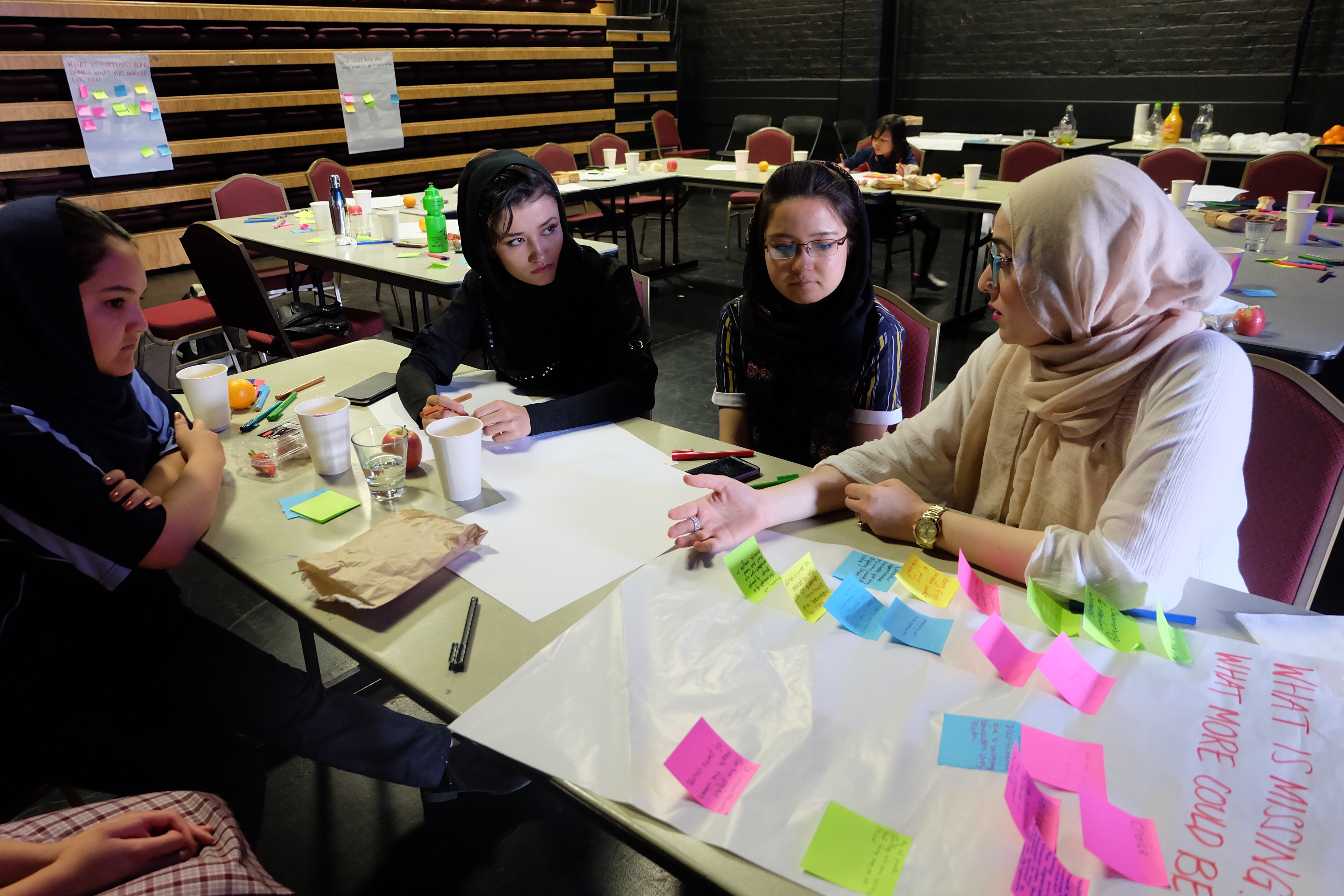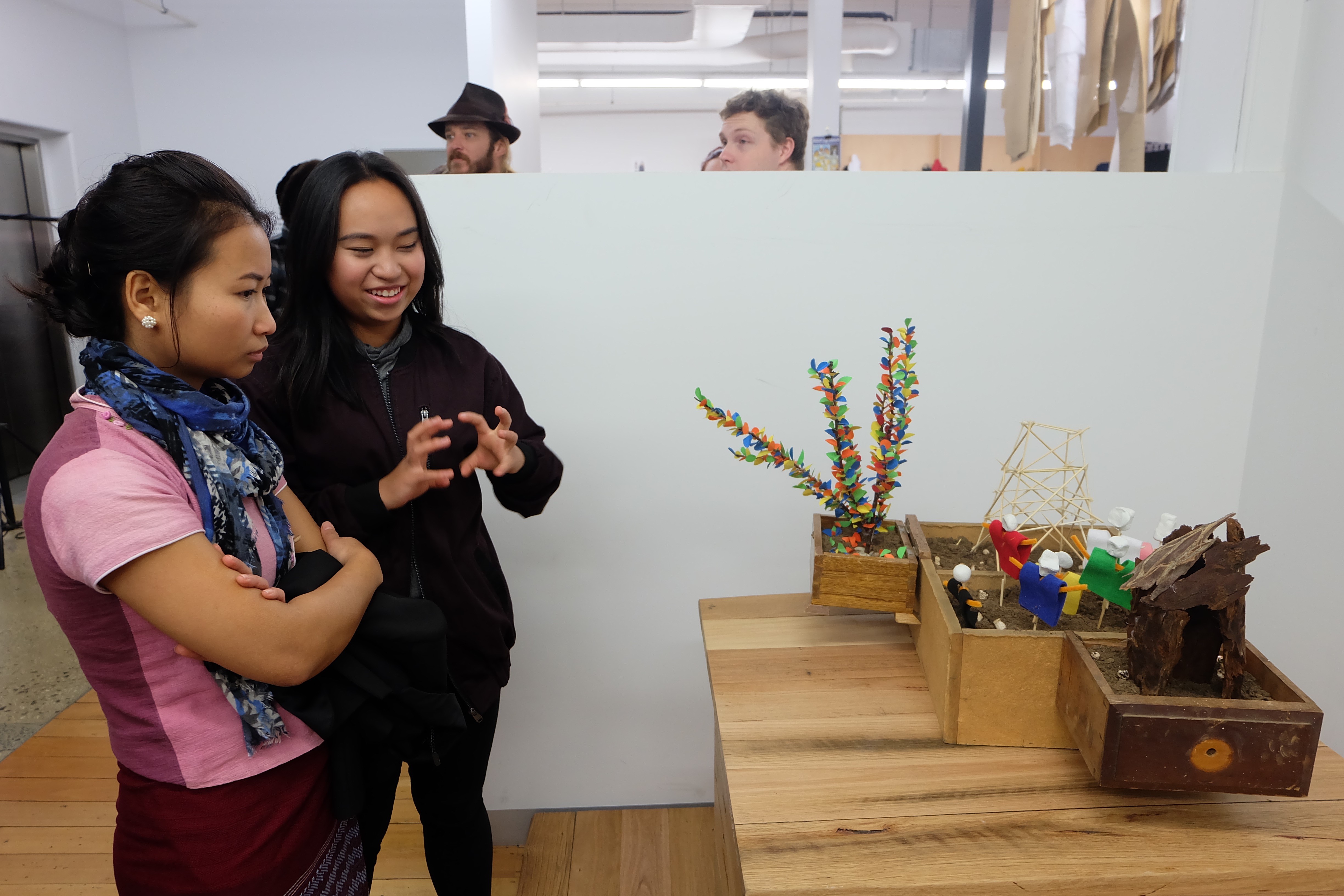- 200 years
- Study
- International
- Business and employers
- Research
- About us
Refugee background and culturally diverse young people should have a voice in the arts programmes that seek to engage them. A new resource offers youth-generated guidance for organisations and artists.

Workshop participants develop guidance for organisations and artists.
Last week was Refugee Week. In our communities of Manchester, UK, and Bendigo, Australia – and in many others – events, exhibitions, performances, and campaigns directed attention to the more than 70 million people worldwide who have been forcibly displaced from their homes and countries. It is a powerful reminder of the creativities, capacities and contributions of people with refugee backgrounds.
Too often, refugees are imagined as passive victims – even by well-meaning organisations and individuals. This is especially true for young people, who are doubly marginalised by their refugee status and life stage. Attending to the challenges young people face in negotiating new places, languages, cultures, communities, and institutions can lead us to overlook their existing knowledge, networks, and skills. The result is that interventions to support refugee-background young people are often designed and implemented for rather than with them.
A key sphere in which this occurs is the arts. Widely recognised as a valuable resource for supporting refugee-background young people, arts programmes engaging with this cohort have proliferated in both Australia and the United Kingdom in recent years. Creative practices – from music to graffiti, photography to weaving – have the capacity to open up spaces for reflection and dialogue within and across communities, drawing on diverse cultural and creative resources to share ideas and experiences. Arts participation can additionally facilitate the development of skills and competencies and foster social connections. And importantly, it can be fun!
But when young people don’t have a voice in how arts programmes are designed and implemented, these benefits are eroded. Young people may be excluded by practical barriers or cultural insensitivities. They may experience their involvement as transactional rather than relational, or as a burden rather than an opportunity. Organisations and artists may un/intentionally determine what can be communicated, and how refugee-background and culturally diverse young people are represented. And crucially, young people may not feel empowered to address any of these issues.
The importance of meaningful arts engagement is something that the three of us have been thinking about, independently and together, for some time. We first collaborated in 2016 on Dispersed Belongings, a participatory arts-based research project that explored belonging among refugee-background young people in regional cities in Australia and the UK. Caitlin was the lead researcher on the project, Pan was a youth artist-researcher, and Forest was an artist-researcher. Along with other youth artist-researchers from Bendigo’s refugee-background Karen community and several artist-researchers, we co-produced the exhibition and performance Belonging in Bendigo.

We learnt a lot on that journey together. In negotiating our different interests, capacities, priorities, and positions, we opened ourselves up to different ways of knowing, making, and communicating. It was sometimes difficult, and we didn’t always get it right, but mistakes and misunderstandings can be important pathways to knowledge and understanding. And we must have done something right because we are still working together!
Dispersed Belongings, and Forest’s subsequent work with Multicultural Arts Victoria’s Bendigo Emerge Cultural Hub (BECH), provided the catalyst for developing and sharing our understanding of what constitutes meaningful arts engagement for refugee-background and culturally diverse young people, and what organisations and artists can do to support it.
And so, in late 2018, the three of us, along with other arts-engaged young people, gathered in Bendigo for a participatory workshop. The workshop was led by a migrant-background artist and supported by BECH Cultural Facilitators from Karen, Hazara, and South Asian backgrounds who are employed to build networks and understandings between ethnic communities and arts-engaged organisations. Drawing together young participants’ diverse ideas and experiences, key issues were identified and explored. We then presented our findings at a forum for local organisations and artists. This forum demonstrated the widespread interest in hearing from and working with young people, and crystalised the information we wanted to share.
The outcome of this process is a 2-page guidance document: Supporting meaningful arts engagement. It provides youth-generated information and advice on seven key issues:
This guidance recognises both the challenges and opportunities for, and vulnerabilities and strengths of, refugee-background and culturally diverse young people – and the organisations and artists who seek to work with them. Contributing to a growing body of resources focusing on arts with refugee-background groups, and on wider issues of refugee and migrant-background youth participation, the guidance has relevance far beyond Bendigo. Indeed, it will play a part in Multicultural Arts Victoria’s #DiversifyYourArts campaign, challenging arts organisations to support diversity and anti-racism.
Importantly, this document, and the process through which it was developed, exemplifies the transformative potential of meaningfully engaging refugee-background and culturally diverse young people in arts programmes. We hope you find it useful.
Caitlin Nunn is a Research Fellow at Manchester Centre for Youth Studies
PanMarLar Pah Thei is a refugee-background Karen young woman. She is a member of Bendigo’s Youth Council. Pan enjoys visual arts and loves to celebrate her culture through dance.
Forest Keegel is a visual artist and Creative Producer of Multicultural Arts Victoria’s Bendigo Emerge Cultural Hub.
This initiative was supported by Manchester Centre for Youth Studies, Multicultural Arts Victoria’s Bendigo Emerge Cultural Hub, Loddon Campaspe Multicultural Services, Creative Victoria, and City of Greater Bendigo.
For more information contact: c.nunn@mmu.ac.uk
